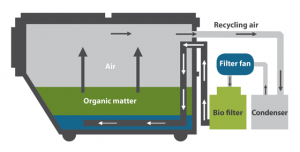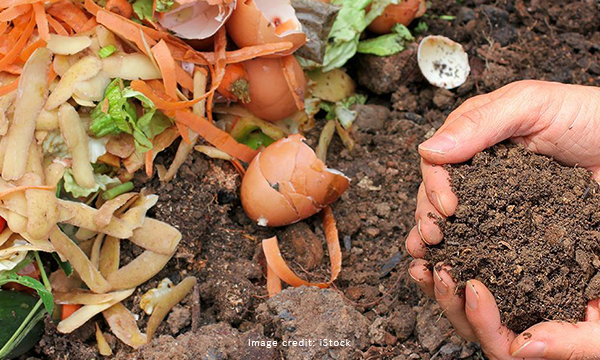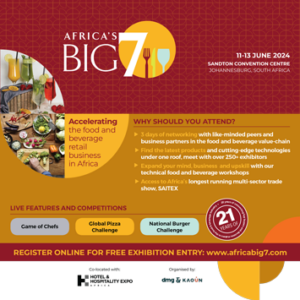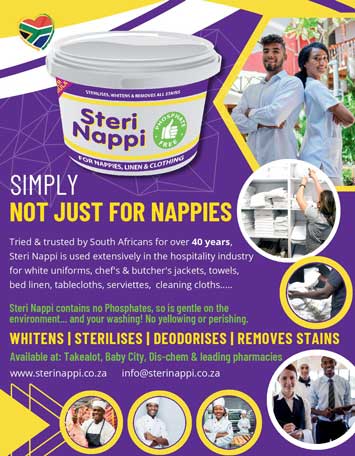BiobiN™ IS THE PERFECT CLEAN, GREEN SOLUTION for restaurants and hotels to manage food waste in an environmentally-friendly way, while also transforming your ‘bin alley’ into a green, fresh and pleasant space: no flies, cockroaches, odours or rodents! Just good, clean, organic compost.
BiobiN™ provides and easy and innovative solution for establishments to manage food waste on-site – while diverting food and organic waste away from landfill sites by composting.
 BiobiN™ has also been carefully designed to reduce odours, flies and rodents – a perennial problem for restaurants with high turnover, leading to overflowing bins in the alley outside the kitchen. The unit is a capture and containment vessel for food and organic material that starts to produce high grade compost immediately.
BiobiN™ has also been carefully designed to reduce odours, flies and rodents – a perennial problem for restaurants with high turnover, leading to overflowing bins in the alley outside the kitchen. The unit is a capture and containment vessel for food and organic material that starts to produce high grade compost immediately.
This innovative waste management system is used globally, and is now available in South Africa through BiobiN™ South Africa. Reducing your “waste footprint” is essential for establishments that are serious about building their green credentials – and saving the planet!
BiobiN™ operates on a rental model, which includes trained operating agents on-site, management of the unit, waste reporting and maintenance.
“By having a BiobiN™ on your premises, not only are you able to produce high quality compost, you also support a solution that seeks to alleviate the pressure on landfill sites due to the biodegradation of organic waste,” says Brian Küsel of BiobiN™ South Africa.
The importance of compost cannot be underestimated as it adds carbon to the soil resulting in reduced water usage and improved yields, which is vital in a country with limited water supply.
“There is a growing need for an organic waste solution such as BiobiN™,” says Küsel. “Food and organic waste in landfill sites rapidly breaks down to produce methane, an atmospheric pollutant that is 22 times more potent than carbon dioxide.” The team at BiobiN™ have recognised that organic waste should be seen as a resource, that when captured and processed correctly, will eventually produce a high quality soil-conditioning product.
To add to the growing need to divert organic waste from landfill, in 2019 the Western Cape Department of Environmental Affairs (WC DEA) recently announced a 100% ban on organic waste to landfill by 2027, with a half-way target of 50% by 2022. Earlier in the year, National Treasury implemented SA’s first carbon tax bill, imposing a carbon tax for carbon emitting activities.
“With a growing pressure from government, the corporate landscape needs to quickly adapt their waste management practices,” says Küsel. “This is also a great opportunity for corporates to show their commitment to reducing their contribution to global warming. A well-implemented recycling system along with a BiobiN™ on the premises is a direct display of a well thought-out corporate social and environmental responsibility initiative.”
Having successfully been launched and piloted in Australia 20 years ago, and widely adopted as a green alternative waste disposal solution around the world, BiobiN™ is now available in South Africa. BiobiN™ operates on a rental model, which includes trained operating agents on site, management of the unit, waste reporting and maintenance.
The BiobiN™ team recently demonstrated the unit at the Landfill 2019 Conference & Exhibition to be in the Western Cape, where all the food waste from the conference was put into the BiobiN™.
To find out more about this innovative organic waste solution, visit the BiobiN™ website at www.biobin.co.za






 Cauliflower Skewers with Pesto Drizzle
Cauliflower Skewers with Pesto Drizzle Lamb & Green Bean Bredie
Lamb & Green Bean Bredie Kerry Kilpin’s Pickled Fish Tacos
Kerry Kilpin’s Pickled Fish Tacos The Table Bay’s Ombré Chia Breakfast Sundae
The Table Bay’s Ombré Chia Breakfast Sundae Best gin Christmas cocktails
Best gin Christmas cocktails All Recipes
All Recipes











